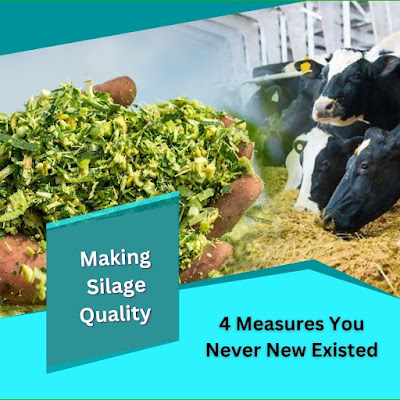Planning ahead for better 2021 silage
We all know that nothing can be done without planning in any field and even if anything is done without a plan, it always results in failure or unwanted results.
As farmers we always look for better
care of our cattle, every year at Patanjali Silage we always plan every year to improve our silage quality and
give better cattle feed. That’s why we made NutriMeal Silage, India’s first packed ready-to-eat corn silage.
Whether your silage last year was
good or bad, there is always room for improvement; today we will give you some
great tips so that you can make your silage better in 2021.
Silage planning tips for 2021
Silage Analysis: - You should start by analyzing your
silage quality from last year, did it do well? Or do you need to improve it;
you should check the metabolism energy of your silage, high metabolism energy
means good quality silage. But if it was low, it could be one of these reasons.
1)
The
swards could have been decayed, resulting in less nutritious grasses.
2)
You
could have made a mistake in making your silage.
You can improve silage production by
cutting the grass when it’s younger and more digestible, increase wilting speed
to minimize energy losses, or improving fermentation for better energy
conservation in the crop.
Communication with a contractor:
- If you are
working with a contractor or a Silage Supplier in Punjab, you should consider early
communication with that contractor is crucial. You should know that everyone
doesn’t have the same schedule, your contractor needs to inform your schedule,
so that, early adjustments can be made.
Your contractor should know every
change in your schedule. Let us say that you are cutting silage earlier for
some reason, you should inform your contractor as soon as possible to avoid
delays. If you are making silage yourself then you should make sure that all
machines are working properly, so that your feed out happens as planned.
Clamp preparation: - You should make sure that your silage
clamp is made well so that it doesn’t spoil all the hard work you put into the
other processes in silage making.
A big problem was faced by farmers in
2020 during silage heating due to air getting in and allowing for yeast and
mold to form spoiling the silage.
This could be because of making dry
silage, but there have been many cases where the walls were weak, which prevented
clamps to be secured to the edges, leaving gaps for air to enter. You should
timely repair your wall so that it can hold the clamps tightly.
You should have enough materials:
- By not having
enough materials, you are adding to poor silage quality or quantity. Materials
such as additives in necessary quantities are very important for preservation.
You should always look for an
additive depending on your dry matter content for better fermentation. You
should also ensure having enough sheeting to keep the clamp airtight.
Plan B: - Noting down your process in advance
is good planning, but you should also have a plan B in case of
changes, such as changes in weather. Another example could be
silage shortage; there is no harm in storing cereal as a whole crop in case
that happens. Overall you should be ready with a plan B.



Comments
Post a Comment